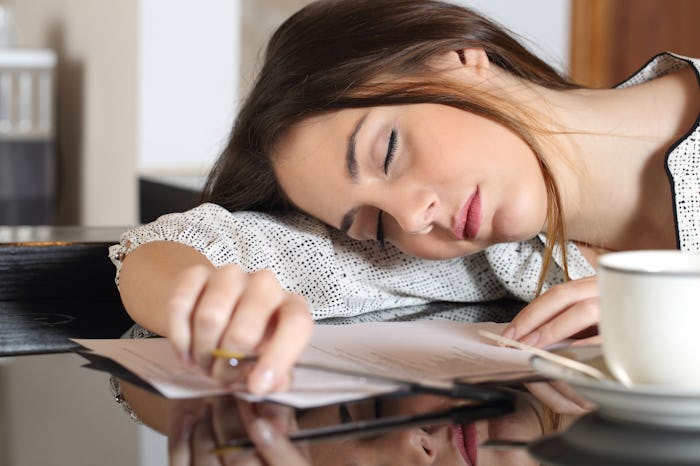Life

9 Surprising Reasons You’re Always Exhausted Besides, You Know, Not Sleeping Enough
There’s no doubt about it — this is the age of doing and, as a result, people today live incredibly busy lives. Whether it’s going to and from social engagements, balancing work with family and friends, taking care of kids, or a combination of them all, chances are your chaotic schedule takes a heavy toll on your energy. And while it’s easy to attribute this to a lack of sleep, there are other reasons why you are tired all the time.
Studies suggest that women generally feel more tired than men, meaning they are more likely to experience symptoms of exhaustion like depression, unhealthy cravings, and headaches. And there are plenty of reasons why women are tired, such as shorter circadian sleep rhythms, stress, and hectic schedules. Unfortunately, many women struggle to find the cause of their exhaustion, so they stick with the same habits and continue to find energy at the bottom of a Starbucks cup. But more often than not, the solution to their sleep woes lies in a few simple lifestyle adjustments. Here are eight surprising reasons you may be feeling tired, and easy solutions that will be sure to make exhaustion a thing of the past.
1Sleeping Too Much
This sounds counterintuitive, right? Logic would dictate that if you get more sleep you will be better rested, but that may not always be the case. According to a study done at Harvard University getting too much sleep can make you feel lethargic and unmotivated throughout the day. Experts at the Sleep Foundation recommend getting somewhere between seven and nine hours of sleep a night.
2 Not Drinking Enough Water
Being even slightly dehydrated lowers your energy levels and makes you crave a nap before you’ve really even started your day. New research suggests average adult females should drink 11 cups of watera day. If this seems daunting, don’t worry. Not all of your H2O has to come from a bottle, as most fruits and vegetables are made up of water. If you combine produce with actual water, then you’re sure to meet your goal.
3Eating Fatty Foods
Similar to water intake, it’s important to be aware of what you’re eating if you want to stay energized throughout the day. A study conducted by the Center for Sleep and Circadian Neurobiology at the University of Pennsylvania found that short sleep duration is associated with weight gain, obesity, diabetes, and cardiovascular disease. Consuming more fruits and vegetables and limiting fat and sugar intake could help you catch a few extra Z’s at night.
4 4. Forgoing Exercise
Skipping a workout to conserve energy may seem like a good idea, but a 2013 survey from the National Sleep Foundation suggests otherwise. Through the survey, it was discovered that, in addition to making people tired, working out help people sleep better. Trade in your nightly Netflix viewing for a light jog, and you may feel more energized the next day.
5Skipping Breakfast
In an effort to save time in the morning, you sacrifice the thing that will keep you awake. Truly the most important meal of the day, skipping breakfast causes you to feel tired and forces you to rely on other things to wake you up. (I’m talking to you coffee addicts.) Getting that boost first thing in the morning will refuel your body and replenish the glycogen stores that supply your muscles with immediate energy. So do yourself a favor and take the extra ten minutes to eat a healthy breakfast.
6Using Electronics at Night
A study by the Journal of Clinical Sleep Medicine discovered that around 90 percent of Americans use technology before bed. While this habit seems harmless enough, using your phone or other technological devices right before bed actually tricks your brain into staying awake longer, making it much more difficult to fall asleep at night. Simply shutting off your TV or phone before bed helps your brain unwind and, in turn, helps you feel more rested.
7 7. Boozing Before Bed
While minimal alcohol use in healthy adults can help you fall asleep quickly, it actually reduces REM (rapid eye movement), the deepest part of sleep that helps you feel rested. Not getting enough REM sleep causes you to wake often during the night and feel drowsy the next day. To ensure that you’re getting the best sleep possible, allow a few hours for the alcohol to leave your system before going to bed.
8Drinking Too Much Coffee
The caffeine from your morning brew blocks the sleep inducing chemicals from your brain, giving you the feeling of awakeness after you drink. But excessive caffeine intake can disrupt sleep patterns, making it difficult to sleep soundly at night. The NSF recommends consuming no more than six eight ounce cups of your favorite roast a day to ensure you’re getting the best sleep possible.
9Stressing Out
Having a to-do list several pages long may help you stay organized, but it isn’t doing your body any favors. The American Psychological Association reports that almost one third of millennials, “attribute lack of sleep to thinking of all the things they need to do or did not get done.” This only continues the cycle, according to the APA, as a lack of sleep often causes more stress. So do yourself a favor and cut down on that to-do list and get a few extra hours of rest tonight.
Image: Antonioguillem/Fotolia; Courtesy of Monica H, EmilianRobertVicol, Steven Depolo, Jasmine Kalodous, KatrinMorenz, m01229, Quinn Dombrowski, Katherine Lim, Thomas Haynie/Flickr